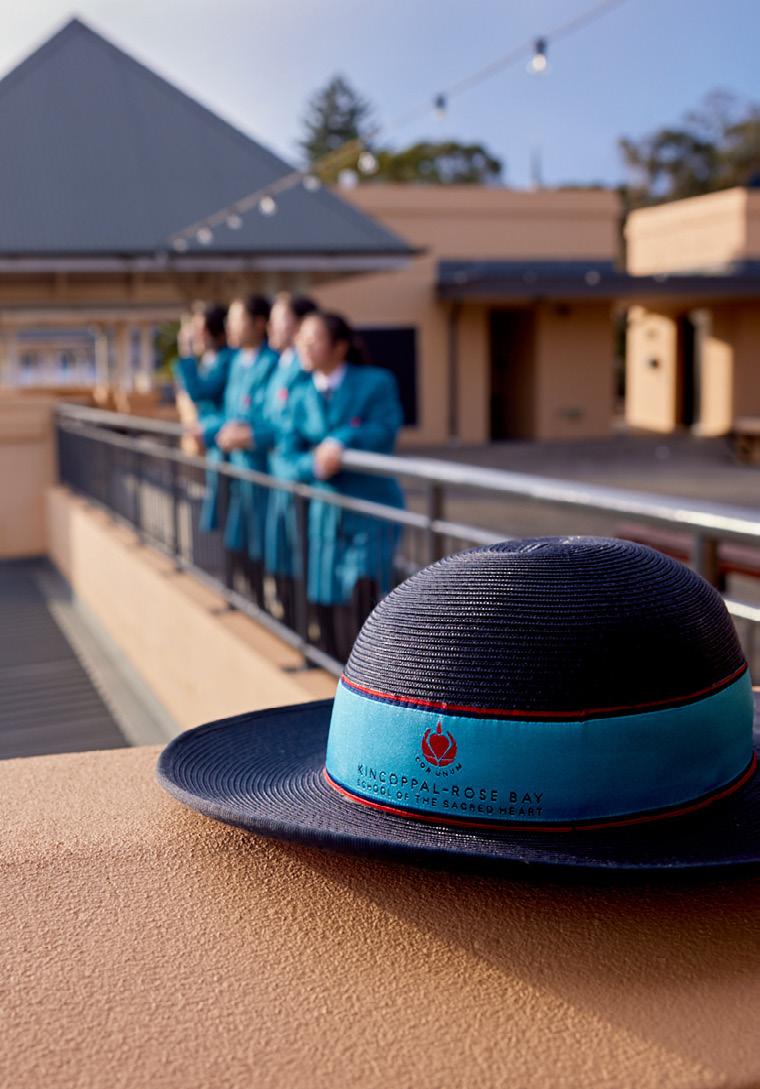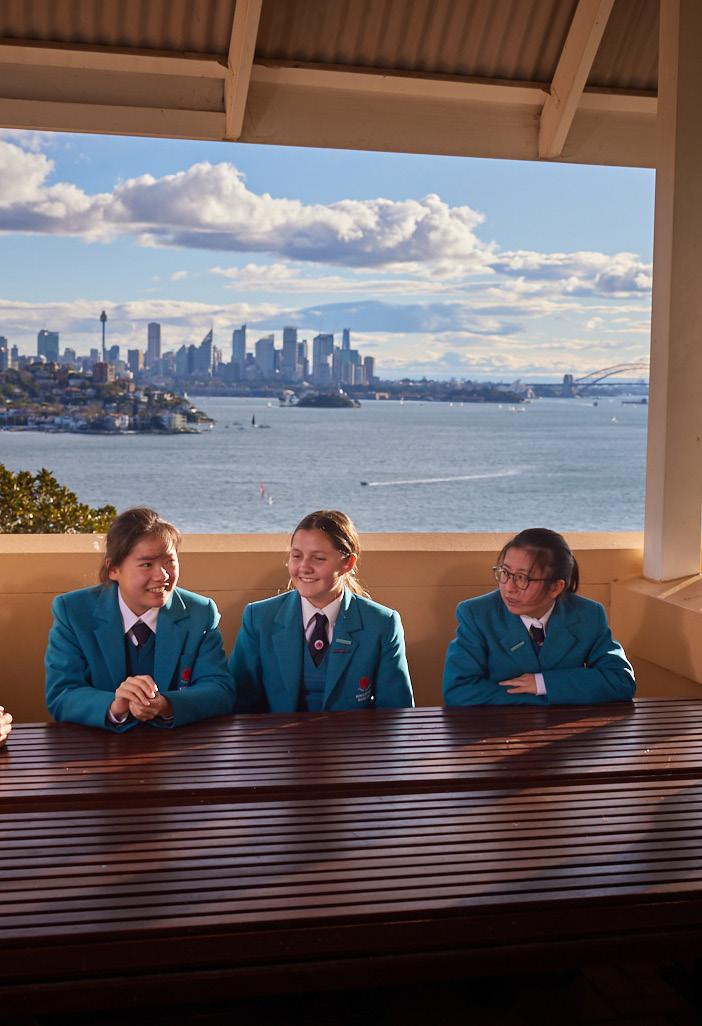

Overseas Students Handbook
Introduction and Welcome
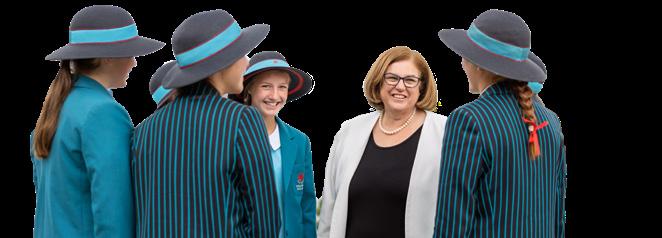
Introduction
The Overseas Students Handbook provides essential information for prospective international students and their parents about the regulations governing Australian schools that enrol overseas students. It outlines the conditions for studying in Australia.
When enrolling at Kincoppal-Rose Bay, School of the Sacred Heart, students agree to follow the regulations and conditions specified in the handbook and related documents. In summary, this handbook serves as a guide to help international students understand their rights, responsibilities, and the support available to them while studying in Australia.
Welcome from the Principal
Thank you for considering Kincoppal-Rose Bay (KRB) School for your child.
Our school educates boys and girls from 3 years of age to the end of Year 6. From Year 7 to Year 12, we educate young women, offering day and boarding places. We welcome students from other countries who enrich our environment and form friendships for life. Their education in English equips them well for the future. Many of our Overseas students go on to tertiary education in Australia or overseas institutions. In its long history KRB has always welcomed overseas students.
The beautiful harbour at Rose Bay is a serene backdrop to the learning, development and adventure that takes place within our school every day. For our youngest students in the Early Learning Centre, our unique campus allows them to experience the joy of nature through their Wild Time program. For our boarders, KRB is a home away from home where they can relax and unwind.
Our educational philosophy focuses on each individual. We are a caring community, providing an enriching educational and cultural experiences for both local and international students. We belong to a network of 150 Sacred Heart schools across 41 different countries and this provides us with a strong outward looking vision that values global perspectives and connections.
We look forward to the opportunity to welcome you to our school community.
Erica Thomas Principal
About Our School
KRB is a member of the International Network of Sacred Heart Schools, conducted by the Society of the Sacred Heart, a Catholic teaching order, established by Saint Madeleine Sophie Barat in France in 1800.
The Convent of the Sacred Heart was founded on this site in 1882. KRB comprises of a co-educational ELC and Junior School for day students, and a Senior School for girls, with both day and boarding students who come from rural NSW, Australia and countries around the world.
KRB offers a Catholic education in the Sacred Heart tradition, underpinned by the Five Sacred Heart Goals. The Goals of a Sacred Heart Education are:
1. A Personal and Active Faith in God
2. A Deep Respect for Intellectual Values
3. The Building of Community as a Christian Value
4. A Social Awareness Which Impels to Action
5. Personal Growth in an Atmosphere of Wise Freedom.
These goals underpin our way of life at KRB and reflect the educational vision of our Founder and the Society.
CRICOS Information
KRB is listed on the Commonwealth Register of Institutions and Courses for Overseas Students (CRICOS). Our CRICOS Provider Code is 02268M. As a CRICOS provider, KRB is registered to deliver Primary (Kindergarten-Year 6), Junior Secondary (Years 7-10) and Senior Secondary (Years 11 and 12) courses to overseas students.
As a registered provider, KRB adheres to the Education Services for Overseas Students (ESOS) Act 2000, which protects international students by ensuring they meet visa conditions and receive high standards of education and support services. The ESOS framework provides financial protection if the institution fails to deliver the promised services. You can find more information about the ESOS framework at https://www.education.gov.au/esosframework

Living and Studying in Australia
Sydney
Living in Australia will be a new experience. There are support services at KRB as well as from other organisations to help make adjusting to life in Australia easier.
Sydney is the capital of the state of New South Wales. It is Australia’s oldest and largest city with a population of around 5.5 million. Sydney is built around a harbour and hosts many tourist attractions as well as beaches including the famous beaches of Bondi and Manly. The city is divided into North and South by the Sydney Harbour, with both the Sydney Harbour Bridge and the Tunnel connecting them.
The central business district is home to modern skyscrapers, historical buildings, museums, art galleries, shopping centres, sporting facilities, restaurants and theatres.
Sydneysiders enjoy a relaxed lifestyle and a pleasant climate most of the year (mainly below 30 degrees Celsius) and cool winters (mainly above 10 degrees Celsius). Our pollution levels are much lower than many countries. We value our leisure time and enjoy our environment by participating in many outdoor activities.
KRB is situated in Sydney’s eastern suburb, in Rose Bay. Rose Bay is a safe harbourside suburb 7kms east of Sydney’s CBD and 15 kms to Sydney airport. Rose Bay shops have supermarkets, chemists and provides an easy walk and bus access for students and families. The area is well served by public transport (bus and ferry) and major shopping and retail areas.
More information about Sydney is available at https://www. sydney.com/
Cost of living
To help international students plan their finances effectively, the Study Australia website offers a Cost of Living Calculator. This tool provides a broad estimate of potential living expenses in Australia, allowing students to compare accommodation options, transportation costs, and other lifestyle choices. By using this calculator, students can better understand the financial requirements for living and studying in Australia, ensuring they are well-prepared for their educational journey
The Cost of Living Calculator is available at https://www. studyaustralia.gov.au/en/life-in-australia/living-andeducation-costs
Water
The quality of water in Sydney and Australia generally is greater than the standards for safe drinking water set by the World Health Organisation. You can drink the water straight from the tap in Sydney. Australia is a much drier country than some and many areas experience drought on a regular basis. Water must be managed carefully at all times.
Roads and Traffic
In Australia we drive on the left hand side of the road. If you come from a country where this is different you must be very careful when crossing the road during your stay in Australia.
Electricity
The electrical current in Australia is 220-240 volts, AC 50 Hz. The Australian three-point pin power outlet is different from many other countries. You may need an adapter which you can purchase from electrical shops and at airports. You may also need a voltage converter for 110-volt appliances.
Customs and Quarantine
Australia has strict customs and quarantine rules. Strict rules prohibiting or restricting the entry of drugs, weapons, firearms, protected wildlife and associated products apply. Please refer to the Australian Customs Service website for further information https://www.abf.gov.au/entering-and-leavingaustralia/can-you-bring-it-in
Australia prides itself in being free from many pests and diseases found in other parts of the world. Your hand and other luggage may be inspected when you arrive in Australia. It is important that you declare items of quarantine concern to avoid being fined or prosecuted for bringing forbidden items into the country. Please refer to the Australian Quarantine website for further information https://www.agriculture.gov. au/biosecurity-trade/travelling
Food
Australians enjoy a diverse range of foods from many different cultures. Meals for the boarding community are catered for by a professional catering service and operates seven days a week. Food is served on a self-select basis from either a hot or cold selection from well-balanced menu, including a nutritional selection of salads, pastas and fruit.
Alcohol, Smoking and Vaping
It is illegal in Australia for persons under 18 years of age to be sold alcohol, cigarettes or other tobacco products. Smoking is prohibited in Australian airports, on buses, trains, ferries and in most public places, including Bondi Beach. KRB is a nonsmoking campus.
Academic Matters
Study and Curriculum
KRB offers NSW Education Standards (NESA) courses in Primary Education, Junior Secondary Education and Senior Secondary Education, which lead to the awarding of the Record of Student Achievement (RoSA) and the Higher School Certificate (HSC). These courses are provided in accordance with NESA requirements.
KRB also offers the Cambridge International Curriculum in Years 9 and 10.
Primary School Studies
(CRICOS Code: 041274A)
Primary School Studies are delivered in the Junior School, where we offer a co-educational environment covering the NSW Education Standards (NESA) courses.
The years of schooling are as follows:
• Early Learning Centre (ELC) – 3 and 4 year olds
• Early Stage 1 – Kindergarten (5 years)
• Stage 1 – Years 1 and 2
• Stage 2 – Years 3 and 4
• Stage 3 – Years 5 and 6.
The School’s educational program in the Junior School is based on and taught in accordance with the NESA syllabus outcomes for the six Key Learning Areas (KLAs) of primary education:
• English
• Mathematics
• Science and Technology
• Human Society and Its Environment
• Creative and Performing Arts
• Personal Development, Health and Physical Education
• Religious Education
• Languages.
Junior Secondary School Studies
(CRICOS Code: 041275M)
Junior Secondary School Studies are delivered in the Senior School and will provide your daughter with a structured educational community, based on the NESA or Cambridge courses, and supported by a strong and vibrant co-curricular program.
Stage 4 – Years 7 and 8
Students study English, Mathematics, Science, History, Geography, Languages, Music, Personal Development Health and Physical Education (PDHPE), Religious Education, Technology and Visual Arts.
Stage 5 – Years 9 and 10
Students study the compulsory subjects of English, Mathematics, Science, PDHPE and Australian History, Geography, Civics and Citizenship. Students can choose from Cambridge International IGCSE Elective Courses in Global Perspectives and Computer Science or NESA Electives in Commerce, Design & Technology, Drama, French, Chinese (Mandarin), Music, Physical Activity and Sports Studies, Visual Arts, Elective History (Year 10).
Senior Secondary School Studies
(CRICOS Code: 041276K)
Senior Secondary School Studies are delivered in the Senior School.
Stage 6 - Years 11 and 12
During the Preliminary Course (Year 11) students must study a minimum of 12 units and during the HSC course (Year 12) students must study a minimum of 10 units to be awarded the HSC. All students must study at least 2 Units of English. At KRB all students are also required to study at least 1 Unit of Studies of Religion. Subjects include English, Mathematics, Biology, Chemistry, Physics, Business Studies, Legal Studies, Economics, Geography, Ancient History, Modern History, Italian Beginners, Chinese Continuers, Chinese and Literature, French continuers, Drama, Music 1 and 2, Health and Movement Science, Visual Arts, Design and Technology, Software Design and Development, Textiles and Design. Extension subjects are also offered.
Homework Centre and Extended Day Program: Additional Tutoring
The School runs a Homework Centre situated in the Senior Library. Its purpose is to provide a secure, supervised homework environment where research is made easier by ready access to physical resources and technology. Librarians, teachers and tutors from different subject areas are available to assist students. Additional tutoring is available in the Senior Library.
Pre-Arrival Information
Visa and Immigration
An overseas student requires a student visa to attend school in Australia. Information about student visas can be found at https://immi.homeaffairs.gov.au/visas/getting-a-visa/ visa-listing/student-500. Overseas students on visas other than student visas may also apply to KRB.
Australian or New Zealand citizens, those holding permanent or temporary resident visas, or refugees, do not require a student visa to attend the school. More information is available at https://www.studyaustralia.gov.au/en/plan-your-move/ your-guide-to-visas/student-visa-subclass-500
Application Process
The Admissions Office at KRB manages the application process and can be contacted at admissions@krb.nsw.edu.au or telephone +61 2 9388 6014. Further information is available at https://www.krb.nsw.edu.au/admissions/enrolment/ More information is available in the School’s 3.6 Overseas Students Enrolment Policy and Procedures.
Education Agents
KRB engages selected educational agents to recruit suitable prospective students on behalf of the school. The agent agreements are non-exclusive.
If at any point during the term of an agreement, the school believes or reasonably suspects that an agent is negligent, careless or incompetent or is engaged in false misleading or unethical advertising or recruitment practices, the agreement may be terminated under the terms set out in the agreement. More information is available in the School’s 3.7 Overseas Students Education Agents Policy and Procedures.
English Language Proficiency
Students must have an appropriate level of English language proficiency. Applicants from a non-English speaking background are required to sit for Australian Education Assessment Services (AEAS) testing which can be done either in Australia or in the student’s home country and at their own expense. Further information about the AEAS test is available on their website https://aeas.com.au/. The requirements for enrolment at KRB at set out in the school’s 3.5 Overseas Students Assessment of English Language Proficiency and Educational Qualifications Policy and Procedures.
English Language Intensive Courses for Overseas Students (ELICOS)
Students requiring English Language Intensive Courses for Overseas Students (ELICOS) before entering KRB are required to undertake the recommended number of weeks of ELICOS at an English language provider.
Age of Entry
The school year starts in January and has two semesters and four terms.
Overseas boys and girls may be accepted from three years of age into the Junior School. Day and boarder girls only may be accepted from Year 7. Entry into the school is usually from the start of the school year at the end of January. Applications for entry during the year will also be considered. Students from a non-English speaking background applying for the Junior Secondary Course (Years 7 to 10) and wanting to commence in Year 10 may do so but must commence Year 10 at the beginning of Year 10 to meet course requirements.
Term dates
All overseas students must attend school for the full academic term commencing the first day of the term and concluding the last day of the term. Failure to attend the full term may contravene student visa requirements and compromise the student’s place at KRB. More information is available in the school’s 3.11 Overseas Students Course Progress and Attendance Policy and Procedures.
Fees
These are outlined in the Schedule of Fees Overseas available on the school website at https://www.krb.nsw.edu.au/ admissions/fees/. It is important to note that fees are subject to annual review and updated accordingly. It is recommended that you read the Schedule of Fees Overseas and familiarise yourself with such policies regarding, e.g. withdrawal etc. KRB reserves the right to update and change the school policy and fees and at such times this will be communicated to parents.
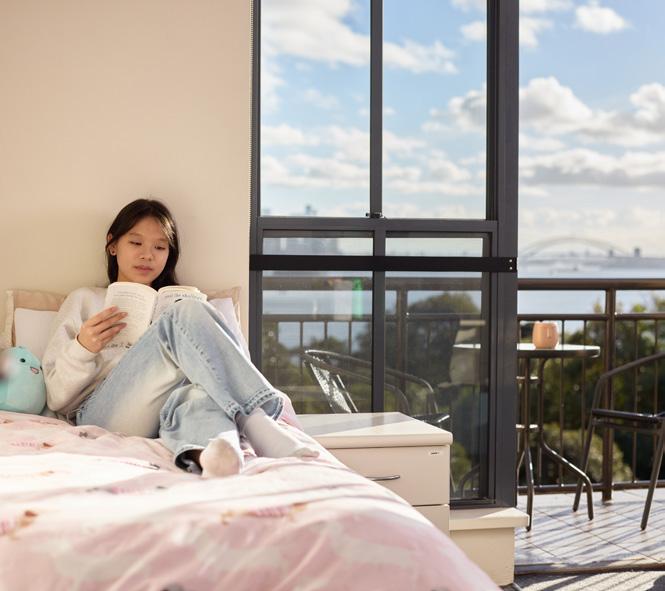
Studying at KRB
Orientation
KRB has a dedicated Orientation Program in place each November for all new students commencing at KRB the following year. This program is run by the Head of Senior School, assisted by various teaching staff and pastoral tutors. New boarders experience a ‘sleep over’ in the boarding school and a chance to enjoy the boarding facilities.
Individual orientation programs are conducted for Overseas students commencing at other times during the year. More information is available in the school’s 3.9 Overseas Students Support Services Policy and Procedures.
Accommodation While Studying at KRB
Students who attend KRB must either live in the KRB Boarding School or live with a parent. No homestay arrangement is acceptable during term time. There are no exceptions to this policy and enrolment may be terminated if this breached. In the KRB Boarding School, we ensure a safe, nurturing environment where students can thrive both academically and personally.
During school holidays students in boarding are expected to return home.
Students are required to have all short term and long-term leave accommodation and welfare arrangements approved by the school, and must inform the school immediately if their circumstances will change.
More information is available in the School’s 3.8 Overseas Students Younger Overseas Students Policy and Procedures.
Notification of Change of Accommodation Arrangements
The Admissions Office will notify the Department of Home Affairs available in PRISMS in the event that an overseas student under 18 changes approved living arrangements or if KRB no longer approves the arrangements.
Overseas students cannot change their accommodation arrangements without written approval from the Principal.
Academic Expectations
Overseas students are expected to adhere to the same academic standards as domestic students. This includes attending classes regularly, completing assignments on time, and participating actively in school activities. Additional support is available for those who may need assistance with language or adjusting to new educational methods. More information is available in the school’s 3.9 Overseas Students Support Services Policy and Procedures.
School Hours and Attendance
School hours are between the hours of 8.25am to 3.10pm in the Senior School and between 8.25am and 3.00pm in the Junior School Monday to Friday. Strict and prompt attendance is required, including for sport training and fixtures and various other compulsory events that may occur before or after normal school hours or on weekends.
All Students are required to attend a minimum of 80% of all scheduled classes. Failure to meet this requirement can be reported to the Department of Home Affairs under student visa regulations. A medical certificate is required after two or more days absence.
Late Return/Early Departure Term Breaks
Students must be in attendance on day one of each term commencement, including the last day of each term. It is unacceptable for a student to return late from a term break unless this has been requested in writing by the parents/ guardians and approved by the Principal in the preceding term. This applies to day one of the school year and late return due to Christmas break and Chinese New Year.
Students not complying with the above early departure or late return requests will be deemed to be in default and therefore reported by the School to Department of Home Affairs on the fifth day of the non-approved late commencement of each term.
Attendance and Course Progress
Attendance is monitored daily. Attendance is required for at least a minimum of 80% of the days that the School is open for instruction. KRB staff will follow up with overseas students who have a pattern of non-attendance or an extended absence. If KRB staff have assessed the overseas student as not meeting course progress or attendance requirements, the Principal will inform the student in writing, including information about the intention to report, the reasons, and the mechanisms available for the student to complain about the school’s decision.
At the commencement of each course, the teacher will provide information to the overseas student about the course and will define what the requirements for achieving satisfactory course progress for the course are.
The school will regularly monitor course progress to identify, notify and assist students at risk of not meeting course progress requirements, in sufficient time for those students to achieve satisfactory course progress.
More information is available in the school’s 3.11 Overseas Students Course Progress and Attendance Policy and Procedures.
Student Behaviour
KRB affirms that all members of its community have the right to enjoy a safe and supportive environment and to feel accepted as worthwhile members of the school. All students are expected to follow the School’s Behaviour Management Policy. This is available on the school’s website at https:// www.krb.nsw.edu.au/about-us/our-policies/
Insurance
It is your responsibility to take out private insurance against accidental loss or damage to your personal items, such as mobile phones, cameras, iPads etc. Notebooks (laptops) that are supplied by the School are covered by the School’s insurance as part of the rental program for this equipment, subject to agreed limits.
Uniforms and Stationery
Kincoppal-Rose Bay School has a uniform policy and requires all students to wear the full school uniform as part of the policy and code of conduct.
A list of uniform items, including updated price list, is provided prior to commencement.
The School Shop located in the school grounds sells all items of school uniform except black lace up school shoes available from the major department stores. Limited items of good quality second-hand school uniforms may be available. Stationery items are purchased externally in the case of Senior School students.
Emergency Procedures
All members of the school community are informed of emergency procedures. Overseas students are provided with an individual card outlining evacuation and lockdown procedures.
Student Support Services
Health and Wellbeing
The wellbeing of our students is paramount. We have policies in place to ensure that all students have access to medical services, counselling, and other health-related support. More information is available in the school’s 3.9 Overseas Students Support Services Policy and Procedures.
Prescription Drugs
If you have been prescribed any prescription drugs you must provide a letter from your doctor with details of your medical condition and the drugs and dosage you will be taking. This information must be given to the School Nurse in the Health Care Centre as soon as possible and no later than seven days within being diagnosed and prescribed the necessary treatment. Prescription drugs are available at the local chemist shops and are only available when you present a prescription from your doctor. Please refer to the Health Care Centre and School Nurse for further information.
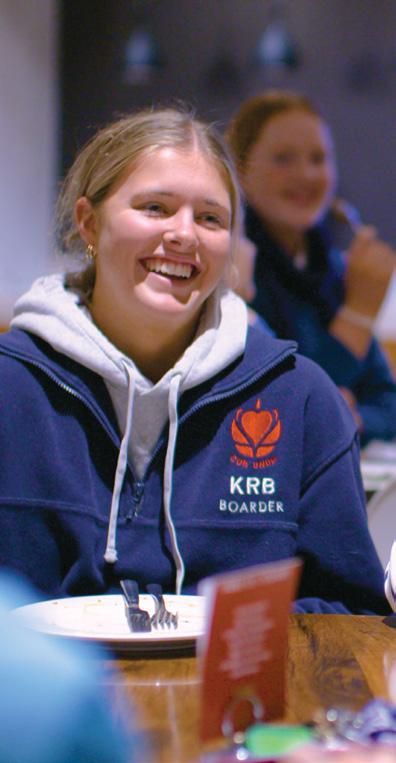
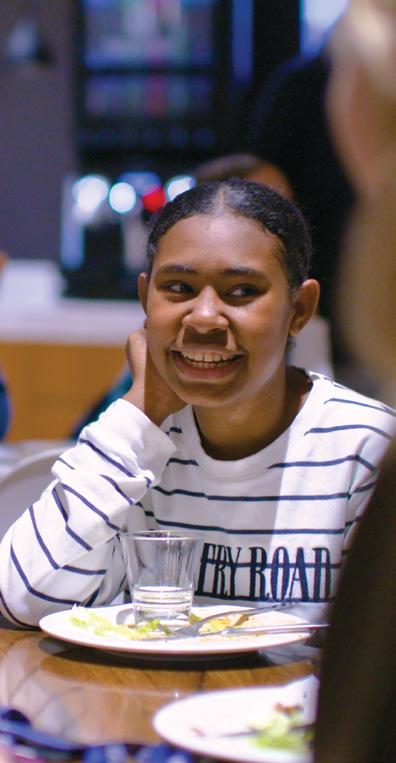
Contact Details
Please contact the following staff members if you or your child have any concerns:
1. Head of Admissions – Mrs Shannon Kennedy, admissions@krb.nsw.edu.au
2. Overseas Student Coordinator – Ms Yin Yang, yangy@krb.nsw.edu.au
3. Head of Senior School – Ms Carrie Scanlan, scanlanc@krb.nsw.edu.au
4. Head of Junior School – Mrs Rachael Symes, symesr@krb.nsw.edu.au
5. Director of Boarding – Mrs Danielle Fairthorne, fairthorned@krb.nsw.edu.au
When to Ask for Help
So that we can help you and ensure your safety, please contact one of the people above if you:
• are feeling unhappy at school or in general
• are having difficulty fitting in
• think you have chosen the wrong subject
• think you need help in a particular subject or area of knowledge
• need help with choosing a career or finding out about your options for the future
• need to renew your health insurance
• need to renew your passport or visa
• need to change your address
• are not doing as well as you think you should be at school
• need to understand some rules or laws about Australian society
• are not well
• need to return home early or return to school late
• are having transport difficulties or are stranded anywhere.
Further Information
For any inquiries or further assistance, please contact our Admissions Team: admissions@krb.nsw.edu.au
We look forward to helping you embark on a successful and fulfilling educational experience at Kincoppal Rose Bay School.

